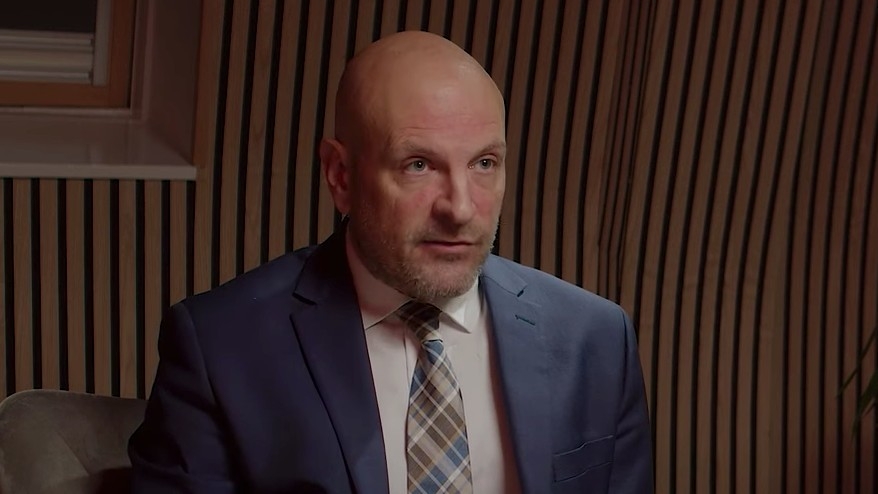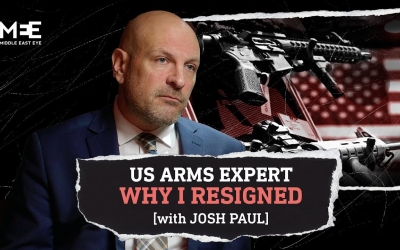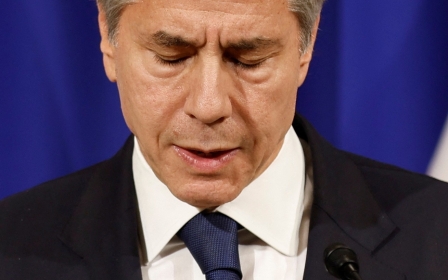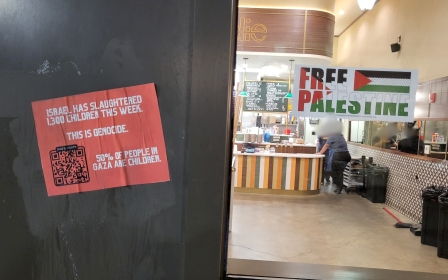Israel-Palestine war: Ex-US diplomat cites 'double standard' in Israel's treatment compared to Ukraine

Former US State Department official Josh Paul has denounced the "double standard" in the Joe Biden administration's Israel-Palestine policy following the 7 October attacks and the subsequent war on Gaza.
Paul told Middle East Eye that very little has been done to regulate arms sales to Israel, in contrast to the sales made to Ukraine following the Russian invasion, which were subjected to thorough internal discussions over what the right weapons were and how they would be used.
This difference in the way Ukraine and Israel are treated is being noticed around the world, according to him.
“There is a blatant level of a double standard,” he said. “And what this has led to, I think it's been clear, is an unwillingness of the global South to stand with us increasingly on Ukraine, to say, ‘why should we vote with you against Russia in the United Nations when your hypocrisy is so blatant, when you are not standing up for the Palestinians?’”
The leeway given to Israel following the 7 October attack may be emotionally driven, according to Paul.
New MEE newsletter: Jerusalem Dispatch
Sign up to get the latest insights and analysis on Israel-Palestine, alongside Turkey Unpacked and other MEE newsletters
“But it's not the job of government to provide emotional responses,” he said. “It's the job of government to be rational, to think through consequences, and that's what I think a lot was missing.”
Josh Paul made headlines on 18 October when he resigned from the US State Department’s Bureau of Political-Military Affairs during the devastating US-backed Israeli onslaught on Gaza.
“I am leaving today because I believe that in our current course with regards to the continued - indeed, expanded and expedited - provision of lethal arms to Israel - I have reached the end of that bargain,” he said in his resignation letter.
Follow Middle East Eye's live coverage of the Israel-Palestine war
The former arms trade expert previously helped the US train Iraqi police and Palestinian security forces and oversaw arms trades to several regimes accused of human rights abuses, including Saudi Arabia during its war in Yemen.
He is now speaking out in the hope of exerting greater pressure on US foreign policy.
Speaking to Middle East Eye in London, Paul said he had tried to initially raise the issue of arms sales to Israel internally by speaking to more senior figures and the Bureau of Human Rights, but to little avail.
“No conversation was being had about whether we should change course,” he said. “And no conversation in Congress.
“In fact, one of the things that really pushed me was that Congress typically does care about human rights," he said.
"You may not see it publicly very much, but behind closed doors, there is always an extensive debate about should we provide these arms to this country, which has a human rights record that is bad, which has engaged in, you know, activities, whether they be repression or civilian casualties, civilian harm.”
American arms sales to other countries could raise questions of institutional conflict of interest, according to Paul. The regulations for sales come from the Directorate of Defense Trade Controls (DDTC), which is partially funded through fees collected from the arms industry.
“So, I think there are significant gaps in what people are aware of and what people can know in the way the system is set up,” he added.
Paul mentioned that while policy is focused on ensuring the events of 7 October are never repeated, he believes the events before that date must be tackled as well.
“You know, on the 6th of October, I tried to call Defence of Children International Palestine; [they] announced that it had been the deadliest year so far for children in the West Bank, over 42 I believe at that point had been killed,” he said, adding that settler violence in the West Bank and the blockade of Gaza were also getting increasingly intense.
The current hostilities in Gaza started when a Hamas-led assault on Israel killed over 1,200 Israelis. In response, Israel heavily bombed the Gaza Strip and invaded it, killing over 17,000 Palestinians including over 6,150 children, and destroying a massive portion of the enclave’s infrastructure.
'A foreign policy disaster'
When asked about the US sending arms to Saudi Arabia during its war in Yemen, Paul said there were many mistakes, some of which are still being made to this day.
He does, however, note the change in policy over the years.
“The first thing the Biden administration did upon coming to office, literally within 20 minutes of being sworn in, was to suspend two arms sales to the Saudi-led coalition in the context of Yemen,” he said, showing the leverage the US can have over allies. “And those sales remain suspended at this time.”
At the time, Paul felt like his presence was making a positive difference and that he was more useful inside the state than outside of it.
'We are slipping back into that model of 'anything goes for national security'... we undermine ourselves by doing so'
- US State Department official Josh Paul
However, the current unwillingness of the administration to condition arms supplies to Israel - despite his attempts at raising the issue - not only made him want to call them out publicly but also raised concerns over the United States' global reputation.
“I think it's a foreign policy disaster,” he said. “I think it is doing great damage.”
A believer in American values and democracy, Paul expressed fears that the US could be slipping back to the model of controversial military operations conducted during the Cold War, and championed by late Secretary of State Henry Kissinger.
“We are slipping back into that model of 'anything goes for national security', when in fact, particularly in this context, where this is a competition about values, we undermine ourselves by doing so. Even more than we would have done during the Cold War.”
Middle East Eye delivers independent and unrivalled coverage and analysis of the Middle East, North Africa and beyond. To learn more about republishing this content and the associated fees, please fill out this form. More about MEE can be found here.





